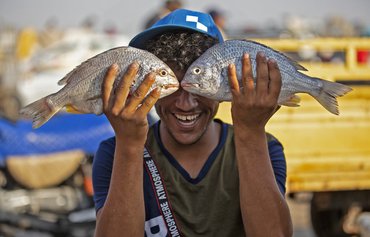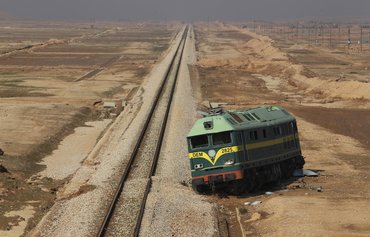AL-FAW, IRAQ -- On the banks of the Shatt al-Arab waterway, Iraqi fishermen live in constant fear of arrest for mistakenly straying across frontiers.
About 15km from where the mighty Tigris and the Euphrates rivers merge and flow out to the Arabian Gulf lies the fishing port of al-Faw.
The port town has been on the front line of two wars that have shaped Iraq's modern history -- in the 1980s against Iran and then after Saddam Hussein's August 1990 invasion of Kuwait.
On the opposite bank of Shatt al-Arab, the green-white-red flag of Iran flutters in the wind, alongside portraits of the Islamic Republic's founder, Rouhollah Khomeini, and his successor, Iranian leader Ali Khamenei.
![An Iraqi fisherman walks past dilapidated boats docked on the bank of the Shatt al-Arab waterway in the southern Iraqi port city of al-Faw, 90 km south of Basra, on October 26. [Hussein Faleh/AFP]](/cnmi_di/images/2021/12/08/33036-Iraqi-fisherman-Shatt-600_384.jpg)
An Iraqi fisherman walks past dilapidated boats docked on the bank of the Shatt al-Arab waterway in the southern Iraqi port city of al-Faw, 90 km south of Basra, on October 26. [Hussein Faleh/AFP]
![An Iraqi fisherman poses for a picture on his boat anchored on the bank of Shatt al-Arab in the southern Iraqi port city of al-Faw on October 26. [Hussein Faleh/AFP]](/cnmi_di/images/2021/12/08/33037-Iraq-fisherman-boat-600_384.jpg)
An Iraqi fisherman poses for a picture on his boat anchored on the bank of Shatt al-Arab in the southern Iraqi port city of al-Faw on October 26. [Hussein Faleh/AFP]
"We have a lot of problems with the Iranians," said Abdallah, an Iraqi fisherman who preferred not to give his surname.
"If we cross the border because of the current, they arrest us."
Arrests and fines
Iraqi fishermen at al-Faw, among them Tareq Ziad, complain of "being harassed" by both Iran and Kuwait.
When their boats leave Shatt al-Arab and head for the open seas of the Arabian Gulf, they often find themselves in Iranian or Kuwaiti waters because of the currents.
The Iranians "put you in prison and make you pay a fine of $3,000. That is what happened to my brother a few days ago. He was arrested by an Iranian river patrol, and he paid $3,000", Ziad said.
Iranian authorities, contacted by AFP, did not respond to a request for comment.
According to Badran al-Tamimi, who heads the fishermen's union in al-Faw, local fishermen have "no support from the (Iraqi) government".
Kuwait also arrests Iraqi fishermen who "inadvertently" venture into its territorial waters, al-Tamimi said.
"Yesterday evening, I went to the Kuwaiti border to bring back three fishermen who were arrested. This week, I have been there three or four times," he said.
"People seized in the border areas are handed over, in good health, by the ground forces, in co-ordination with the Iraqi side," a Kuwaiti security official said, on condition of anonymity.
Environmental concerns
Environmental issues also are of increasing concern to Iraqi fishermen who rely on the waterways for their livelihoods.
There has been a marked decline in water inflows from Iran, as a consequence of the Islamic Republic's blocking or diverting the course of rivers that originate in its territory.
Iraq depends primarily on water releases from Turkey to the Tigris and Euphrates rivers, which constitute 56% of its total water resources.
A further 12% comes from rivers and tributaries that flow into the country from Iran, while the rest comes from internal sources such as lakes and wells.
Iran has constructed new dams in recent years that have changed the course of the Karun, which flows into Shatt al-Arab, diverting its waters.
Iraq is now seeking reconsideration of the 1975 Algiers Agreement signed with Iran, which government officials said includes "unfair" clauses related to the regulation of water supplies between the two countries.
But the Iranians are insisting on keeping the agreement as it stands.
Despite its move to appeal for international arbitration, however, Baghdad does not want to close the door on dialogue with Iran.
Smaller catches
"We go out to sea for eight to 10 days and when we return, we've caught between 500kg and one tonne, compared to three or four tonnes 20 years ago," complained fisherman Abdallah.
Fishing expeditions have become much shorter, and the boundaries are closely monitored by Iraq's neighbours.
In addition, the price of fuel has shot up.
As Iraqi rivers shrink from drought and the construction of dams in Iran and Turkey, so too does the amount of seasonal fish that locals relied on for food.
And while the river waters ebb to ever lower levels, the Arabian Gulf rises.
"We are seeing more and more marine species in the river as the water becomes saline," said Iyad Abdelmohsen, a marine biologist at Baghdad's Al-Mustansiriyah University.
And the by-products of "human activities, such as sewage and waste", that end up in Iraq's waterways are causing "digestive illnesses, diarrhoea and even cholera", he said.

![Iraqi men fish in their boat anchored in the Shatt al-Arab waterway next to the wreckage of a ship which was sunk during the 1980s Iraq-Iran war, in the southern Iraqi port city of al-Faw on October 26. [Hussein Faleh/AFP]](/cnmi_di/images/2021/12/08/33035-Iraqi-fishermen-Shatt-600_384.jpg)






